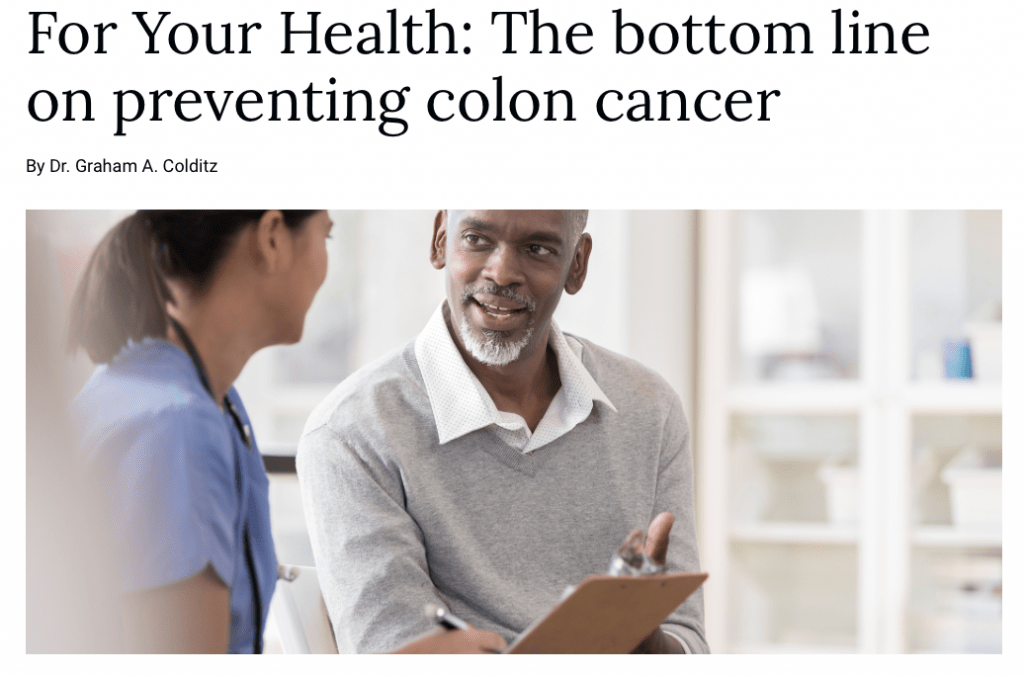“Taking action now to prevent cancer and other serious illnesses will help keep you much safer and healthier in the long run.”
Dr. Jean Wang
Last March was a blur. The COVID-19 outbreak was officially classified as a pandemic, much of the nation went into some level of safety lockdown, and the healthcare system had to adjust quickly to both treat patients and help contain the infection.
So, aptly, it was a relatively quiet March for National Colorectal Cancer Awareness Month – and our 2020 For Your Health column highlighting its messages (below).
This year, however, those same messages about the benefits of screening and other steps that can help prevent colon cancer may resonate even more than they usual. With many of us having missed screening tests and other key medical appointments over the past 12 months because of the outbreak, National Colorectal Cancer Awareness Month is a great reminder that we need to begin to get back on track with our care.
As Dr. Jean Wang said in a related September column: “It’s important to make sure you still get recommended cancer screenings, even during the pandemic. Taking action now to prevent cancer and other serious illnesses will help keep you much safer and healthier in the long run.”
While the pandemic is still serious, most hospitals and providers are back to a much more normal schedule of care and have procedures in place to help keep patients safe during visits.
If you’ve missed any screenings during the past year, or if it’s simply time for regular appointments, check in with a provider about scheduling visits.
As the new ad campaign from the CDC says: “Cancer doesn’t wait. Neither should you.”

Originally published March 2020
March is National Colorectal Cancer Awareness Month, and while that may not be the first thing that pops to mind in this month of March Madness and the first days of spring, it’s worth paying attention to. Really.
Colon cancer is the third most common cancer in men and women in the U.S. About 145,000 people are diagnosed each year, and a growing number are younger than 50. Yet, countering such sober statistics is the fact that colon cancer is also one of the most preventable cancers.
The most important step you can take to lower your risk? Getting screened.
“It’s estimated that 75 percent of colon cancers could be prevented if everyone had the recommended screening tests,” said Dr. Jean Wang, professor of medicine at Washington University School of Medicine in St. Louis.
Screening can not only catch colon cancer early, when it’s more treatable, it also can help prevent it in the first place – by finding and removing growths that could turn into cancer.
Screening typically starts at ages 45 to 50. Some people at increased risk, including those with a family history of cancer, may start earlier and be screened more often.
There are many effective screening tests available. Some are quick and easy but need to be done more often, like the FIT stool test. And some are more involved but need to be done less often, like colonoscopy.
Which test a person chooses can depend on a number of different factors. These can include the cost, the distance to a screening facility and the amount of time needed to prepare for and then complete the test.
“The number of choices available for screening can sometimes be confusing, so definitely talk to your doctor about which one would be the best option for you,” Wang said.
Ultimately, the best screening test is the one that gets done.
On top of screening, healthy behaviors also can play an important role in lowering your risk of colon cancer, she added. These include keeping weight in check, not smoking, exercising regularly, eating more whole grains and limiting red meat, processed meat and alcohol.
It can feel like a bit of a laundry list, but as with many of the positive habits we try to work on, they don’t need to be tackled all at once. You can start small and build on your successes. Make a call to your doctor about screening. Skip the bacon on tomorrow’s sandwich. Go for a 10-minute walk at lunchtime. These single steps can make a real difference, laying the foundation for further positive changes.
So, during this National Colorectal Cancer Awareness Month, celebrate your health by keeping this bottom line in mind:
“Colon cancer is much more common than you think, but you can take simple steps to help prevent it, with screening being the most important,” Wang said.
Dr. Graham A. Colditz, associate director of prevention and control at Siteman Cancer Center at Barnes-Jewish Hospital and Washington University School of Medicine in St. Louis, is an internationally recognized leader in cancer prevention. As an epidemiologist and public health expert, he has a long-standing interest in the preventable causes of chronic disease. Colditz has a medical degree from The University of Queensland and a master’s and doctoral degrees in public health from Harvard University’s T.H. Chan School of Public Health.